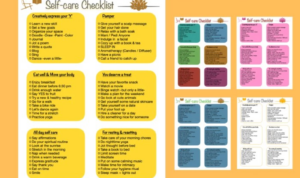Healthy Lifestyle Tips encompass a range of practices that can transform your well-being. From nutritious eating habits to regular physical activity and stress management, these tips offer a holistic approach to living your best life.
When it comes to maintaining a healthy lifestyle, small changes can lead to significant improvements in your overall health and happiness.
Benefits of a Healthy Lifestyle

Maintaining a healthy lifestyle is crucial for overall well-being and quality of life. By incorporating healthy habits into your daily routine, you can reap numerous benefits that positively impact your physical and mental health.
Improved Physical Health
- Regular exercise helps strengthen muscles, improve cardiovascular health, and boost immunity.
- A balanced diet rich in nutrients can prevent chronic diseases and promote optimal body function.
- Adequate hydration supports digestion, circulation, and overall organ function.
Enhanced Mental Well-being
- Healthy habits like meditation and mindfulness reduce stress levels and promote relaxation.
- Adequate sleep supports cognitive function, mood regulation, and overall mental clarity.
- Engaging in hobbies and social activities boosts mental stimulation and emotional well-being.
Increased Energy Levels
- Regular physical activity improves stamina, increases energy levels, and reduces feelings of fatigue.
- A balanced diet provides essential nutrients that fuel the body and sustain energy throughout the day.
- Proper rest and relaxation help recharge the body and mind, ensuring optimal energy levels.
Long-Term Health Benefits
- Reduced risk of chronic diseases such as heart disease, diabetes, and certain cancers.
- Improved longevity and quality of life by maintaining a healthy weight and overall well-being.
- Enhanced immune function to better combat infections and illnesses.
Nutrition Tips for a Healthy Lifestyle
Eating a nutritious diet is crucial for maintaining a healthy lifestyle. It provides the body with the essential vitamins, minerals, and other nutrients needed to function properly.
Include Nutrient-Rich Foods
It’s important to include a variety of foods that are rich in nutrients in your daily diet. Some examples of such foods include:
- Leafy green vegetables like spinach, kale, and broccoli
- Fruits such as berries, oranges, and apples
- Whole grains like quinoa, brown rice, and oats
- Lean proteins like chicken, fish, tofu, and legumes
- Dairy or dairy alternatives for calcium and vitamin D
Stay Hydrated for a Healthy Lifestyle
Staying hydrated is essential for overall health and well-being. Water helps to regulate body temperature, transport nutrients, and flush out toxins. It is recommended to drink at least 8-10 glasses of water per day, and even more if you are physically active.
Importance of Balanced Diet and Portion Control
A balanced diet provides the body with the right combination of nutrients from different food groups. This includes carbohydrates, proteins, fats, vitamins, and minerals. Portion control is also crucial to prevent overeating and maintain a healthy weight. Be mindful of serving sizes and listen to your body’s hunger cues to avoid overindulging.
Physical Activity and Exercise: Healthy Lifestyle Tips
Regular exercise is essential for maintaining a healthy lifestyle as it provides a wide range of benefits for both physical and mental well-being. Exercise helps in managing weight, reducing the risk of chronic diseases, improving mood, and boosting energy levels.
Benefits of Regular Exercise, Healthy Lifestyle Tips
- Improves cardiovascular health by strengthening the heart and improving circulation.
- Enhances muscle strength and endurance, promoting overall physical fitness.
- Helps in maintaining a healthy weight by burning calories and increasing metabolism.
- Boosts mood and reduces stress levels through the release of endorphins, the body’s natural mood elevators.
Types of Exercises for Various Fitness Levels
- Low-impact exercises like walking, swimming, or yoga are suitable for beginners or individuals with joint issues.
- Strength training exercises using body weight or resistance bands can help in building muscle and improving overall strength.
- High-intensity interval training (HIIT) involves short bursts of intense exercise followed by rest periods, ideal for those looking to increase cardiovascular fitness.
Importance of Incorporating Physical Activity
Regular physical activity should be a part of daily routines to ensure a healthy lifestyle. It not only helps in maintaining weight and improving fitness but also reduces the risk of chronic conditions like heart disease, diabetes, and obesity. Finding enjoyable activities and setting realistic goals can make it easier to stay motivated and consistent with exercise routines.
Mental Health and Stress Management

Mental health is an essential component of overall well-being and is closely linked to a healthy lifestyle. When we take care of our physical health through proper nutrition and exercise, we also support our mental health. The connection between the two is strong, as physical activity releases endorphins that can improve mood, reduce stress, and boost self-esteem.
Tips for Managing Stress Effectively
Stress is a common part of life, but it’s important to manage it effectively to prevent negative impacts on mental health. Here are some tips:
- Practice relaxation techniques such as deep breathing, meditation, or yoga.
- Stay organized and prioritize tasks to avoid feeling overwhelmed.
- Engage in hobbies or activities you enjoy to unwind and relax.
- Connect with friends and family for support and to talk about your feelings.
- Get regular exercise to release built-up tension and stress.
The Importance of Self-Care Practices for Mental Well-being
Self-care is essential for maintaining good mental health and overall well-being. It involves taking time to prioritize your own needs and engage in activities that nurture your mind, body, and soul. Some self-care practices include:
- Getting enough sleep to recharge and rejuvenate your body.
- Eating nutritious foods that fuel your body and support brain function.
- Setting boundaries and saying no to things that cause you stress or anxiety.
- Engaging in activities that bring you joy and relaxation, such as reading, listening to music, or spending time in nature.
- Seeking professional help when needed, such as therapy or counseling, to address mental health concerns.


